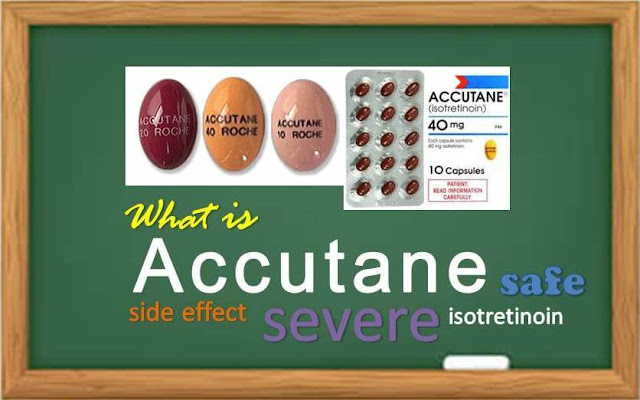 |
| What Is Accutane For Acne |
Accutane is a medication used to treat severe cases of acne ( cystic/nodular ) that usually given when other acne medicines or antibiotics, or other acne treatments like topical creams have been tried without successful treatment. It is an oral medication, in pill/capsule form that is usually taken once or twice daily.
Accutane is aslo known as brand name for isotretinoin, a class of drugs called retinoids ( a vitamin A derivative ). This drug is considered to be the ultimate, end-all medication for eliminating acne.
The brand name accutane now has discontinued and not being used, and isotretinoin is a generic name that’s now marketed under various labels, including Absorica, Amnesteem, Claravis, Myorisan, Sotret and Zenatane.
It also prescribed for other uses, including other skin problems and used to prevent certain kinds of skin cancer and treatment of other cancers.
Is Accutane Safe For Acne?
Accutane is a powerful drug that generally very effective in helping treat acne. But It comes the risk of serious side effects.This drug is a form of vitamin A, which can reduce the amount of oil released by oil glands in your skin, and helps your skin renew itself more quickly.
But because vitamin A can build up in the skin tissues, it can quickly become a problem. You shouldn’t take vitamin A supplements while taking this accutane.
Accutane is meant to be taken only for people with severe acne and not everyone is a candidate for this treatment.
The dermatologist may will have you to try other acne medications first when you have mild to moderate acne.
But if you have already tried other acne medication or treatments for your severe acne without much success, this accutane may be an option.
As an important notice, the dermatologist is your best resource, so ask for her opinion. Even if accutane isn't the right treatment for you, he will have other treatment options suitable for you.
Accutane Dosage
The dose of this drug is depend to each person, it usually can based on your body weight. Some brands of this accutane usually should be taken with food or milk.Besides, the treatment usually spends lasts four to five months. It’s important that never take more than prescribed by a doctor.
What is Accutane Side Effects?
Although accutane is good and effective medication to treat acne, the sufferer should carefully consider the several disadvantages when using accutane. The drug is not only expensive, but it also has some potential serious side effects.The common possible side effects of accutane include:
- Dry eyes, mucous membrane of the eye and minor
- Dry lips, mouth, nose or skin
- Itching
- Joint and muscle aches
- Nosebleeds
- Peeling skin, especially on the palms and soles
- Red, cracked, sore and inflammation of the lips
- Swelling of the eyelids
- Temporary thinning of hair
Other more serious side effects of accutane include:
- Difficulty or pain when swallowing
- Dizziness, headache, stomach or chest pain
- Fainting
- Impaired wound healing
- Increased blood cholesterol
- Jaundice
- Muscle weakness
- Nausea and vomiting
- Ringing in the ears
- Seizures
Rare side effects
The usage of accutane also has some rare side effects include:- A Stroke
- Abnormal liver function
- Anemia
- Allergic skin
- Bleeding gums
- Bloody urine
- Cataracts
- Decreased vision at night
- Depression
- Fast or pounding heartbeat
- Hearing Loss
- High blood sugar
- Hepatitis
- Inflammatory bowel disease
- Nodular inflammatory skin lesions
- Osteoporosis
- Swollen lymph nodes
Other side effects not listed above may also occur in some people. If there are any other effects, better check with your health care professional.
Contact your doctor for medical advice about side effects before deciding to use it on your acne treatment.
Important Warning of Accutane Side Effect
Female patients who are in pregnancy or may become pregnant must not use accutane because there is a high risk of birth defects and miscarriages.Besides, this drug may pass into breast milk, so it also isn't safe to take while breastfeeding.
They should understand the risks of this medicine and usually must sign up for a pregnancy risk program called iPLEDGE in order to receive their isotretinoin prescription each month.
Better contact the doctor before using this accutane for acne treatment.
Important Warning Before Using Accutane
You should not take accutane if you are:- Pregnant or planning to get pregnant
- Breastfeeding
- Allergic to this drug
- Allergic to soybean oil
What Are Alternatives to Accutane?
There are some alternative acne medication besides accutane although these alternatives are not the same as accutane medically, they can effectively treat acne.1. Retinoid
Retinoid is topical medication, unlike accutane and it means should apply to your skin for usage.This drug has less side effects than accutane. You may experience irritation, redness, some temporary skin dryness and peeling skin while taking retinoid, which these symptoms will disappear once you stop taking them.
Just like accutane, you must not take these medications if you are pregnant.
2. Benzoyl Peroxide
Benzoyl peroxide is also a topical medication you may try when you have mild or moderate acne.This medication is available over the counter and also have some side effeects, such as irritation, some minor skin redness and peeling skin.
3. Antibiotic
This medication can be applied to your skin or taken by mouth as a pill and it is relatively cheaper than accutane.An antibiotic can help by clearing out the acne-causing bacteria from your pores. But it may not be the right option if you have more serious and chronic case of acne because long-term use of antibiotic can cause bacteria to develop resistance and it may become less effective over time.